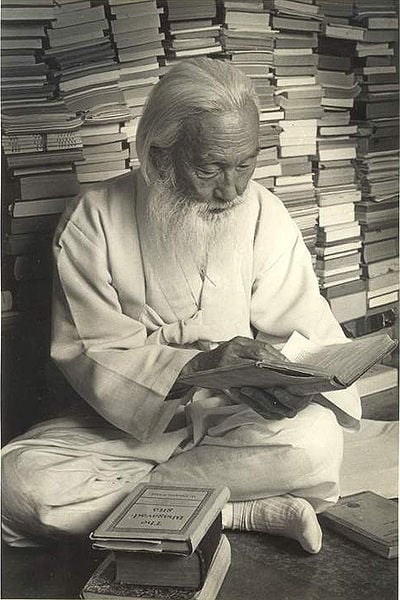
The Korean Quaker pacifist Ham Sok Hon was born in Pyong-an, a region now part of North Korea.
In 1919, he took part in a nationwide pro-democracy demonstration opposing Japanese occupation of Korea. Later called the March 1 Movement, two million people participated in the protests, which included the reading of a declaration of independence for Korea.
He traveled to Japan in 1923 to study education. While there, he became involved in the Non-Church Movement, a Christian religious organization whose adherents worshiped without sacraments or liturgies. The Non-Church Movement espoused pacifism and did not ordain clergy.
In 1928 he became a history teacher in Korea. He spent a decade teaching history at the Osan School. He wrote the book Queen of Suffering: a Spiritual History of Korea about Koreans’ history as an oppressed people, for which he was imprisoned. Teaching Korean history and language was outlawed during the colonial period. He was again incarcerated in 1940 and 1942.
Japan’s colonial rule of Korea ended in 1945 after Japan surrendered at the end of World War II. The Soviet Union occupied the section of the country north of the 38th Parallel and the United States took control of the southern zone. Believing Koreans had a spiritual tie to their homeland, Hon opposed division and foreign control of the country. The Communist government, which opposed his Christian convictions and political activism, incarcerated him again.
In 1953, he met Quakers for the first time when they were offering humanitarian aid to victims of the Korean War at an assistance camp in Kunsan. He appreciated Friends’ antiwar convictions and commitment to social justice. After breaking with the Non-Church Movement over what one biographer described as an illicit romantic relationship, Ham began worshiping with the Seoul Meeting in 1958.
He went to the Pendle Hill Quaker study, retreat, and conference center in Wallingford, Pa. as well as to Woodbrooke Quaker study center in Birmingham, UK. He became a Quaker in 1967.
Ham cited Howard Brinton as a Quaker who particularly influenced him. Kenneth Boulding’s 1970 Swarthmore Lecture “The Prospering of Truth” also impacted him deeply.
He became a leader in the Seoul Meeting.
Ham remained committed to nonviolence and activism for Korean civil rights in the face of government repression. He translated Mahatma Gandhi’s autobiography and was nicknamed the Korean Gandhi.
Quakers from the United States nominated him for the Nobel Peace Prize in 1979 and 1985.
Suggestions for Further Reading
Chuck Fager reviews Ham Sok Hon: Voice of the People and Pioneer of Religious Pluralism in Twentieth Century Korea for Quaker Theology
Quakers in the World discusses Quakers in Korea
Ham Sok Hon’s Kicked by God, published by American Friends Service Committee (PDF)
“The Complex Hybridity of Ham Sok-Heon,” by Christy Randazzo, in Quaker Religious Thought (PDF)
